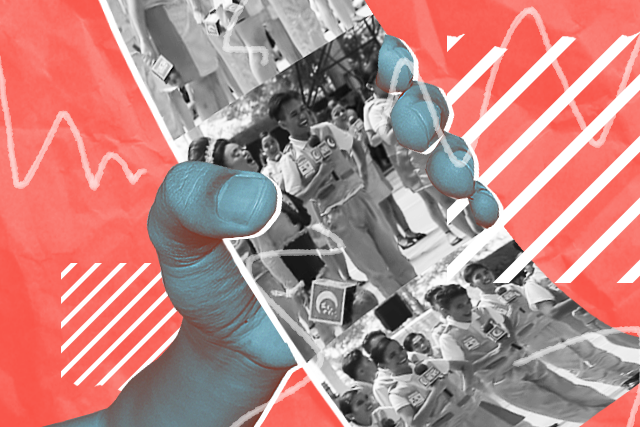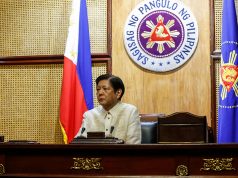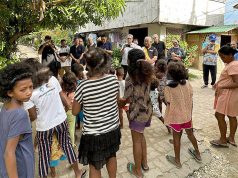
The college cheer with the satirical line “Let’s kill the president” triggered online harassment and red-tagging from vocal supporters of President Rodrigo Duterte even when he himself made such slurs downplayed as jokes in his presidential speeches.
Members of the Skimmers, a dance group from the University of the Philippines-Visayas, received threats and harassment following their dance routine that highlighted social issues became popular online.
The Skimmers’ 15-minute performance wherein they were dressed as reporters in pink bagged the championship title at the UPV Pahampang, the annual sports fest of the university, last October 16.
Unlike y'all, I get my news from a reliable source.
[Courtesy: Ruperto Quitag / WATCH THE FULL VIDEO: https://t.co/BI9ocQxGoS] pic.twitter.com/OEFy7eaHJE
— Malacañang Events and Catering Services (@MalacananEvents) October 18, 2019
Some Filipinos pointed out the double standards of Duterte’s supporters, particularly blogger-turned-official Mocha Uson, when attacking his critics online.
They cited some of the disturbing statements Duterte has uttered against his critics, drug users and members of the Catholic Church.
Skimmers: Let’s kill this president cHAROT!!!
DDS: walang values ugh sayang tax namin sa inyo
Digong: Kill them all! Shoot them in the vagina!!! Death sentence!!!!
DDS: dIGong pArA tAlAga sA piLipino cOOl pOst thAnkS fOr sHariNg ❤️
and i oop#HandsOffSkimmers
— Theo Pido (@pidotheo) October 19, 2019
“When you joke about killing the president, you’re promoting violence but when the president jokes about killing people then he’s just joking?” one Twitter user pointed out.
Welcome to the Phlippines!
When you joke about killing the president, you're promoting violence
but
When the president jokes about killing people then he's just joking?
Baw ka chaka!
— #HANDSOFFSKIMMERS 🌙🌠 (@trexmariu) October 19, 2019
Duterte has made regular controversial comments since becoming president in 2016, some of which have been interpreted as encouragement for extrajudicial killing. He made “shoot-to-kill” orders and mysoginistic remarks on rape, which his supporters often downplayed as jokes.
In 2016, Duterte proposed to communist rebels to hold their guerilla and illegal courts and carry summary executions of illegal drug users.
He also claimed to have killed someone when he was 16 years old when he visited the Filipino community in Da Nang, Vietnam in 2017. He also went on and said he would kill those who commit crimes against Filipinos.
Former spokespersons Harry Roque and Ernesto Abella would downplay Duterte’s comments as having been made in jest.
Duterte waged a verbal war against the Catholic Church in the latter part of 2018 during which he said: “These bishops that you guys have, kill them.”
When Cardinal Luis Antonio Tagle, the archbishop of Manila, informed him that he received death threats, the president suddenly changed tune and warned the public against harming priests, nuns or other religious people.
Last October 17, Duterte asked newly assigned Lt. Col. Jovie Espenido, a senior police official whom he assigned to Bacolod City, “to kill everybody”
“Bacolod is badly hit (by illegal drugs) now. I placed Espenido there. I said, go there, you are free to kill everybody. Start killing there. Dalawa na lang tayo pa-preso,” he said.
Espenido was the police official in Ozamiz City, Misamis Occidental when late Mayor Reynaldo Parojinog and others were killed in a series of so-calld counternarcotics operations.
Another satire taken seriously
Any form of satire is “protected speech,” according to a Supreme Court ruling in the case between the Diocese of Bacolod versus the Commission of Elections in 2015.
According to the decision, satire is “a literary form that employs such devices as sarcasm, irony and ridicule to deride prevailing vices or follies.”
It has also been around for years and has been an effective tool to expose societal and political flaws.
Moreover, it is within the group’s rights of speech and expression to convey those messages as stated in Section 4 of the 1987 Constitution, wherein no law shall be passed abridging the freedom of speech, expression or the press.
This was the second time this October that viral satirical posts are passed off as “news” or direct statements by officials.
Celina Pialago, spokesperson of the Metro Manila Development Authority, recently sued satire account Barurot News and comedy page Pinoy Laugh Page due to a satirical meme of her.
Online harassment
Harassment against the members of Skimmers, who were students of literature and communication and media studies, included spreading their personal information online, spewing hate messages and making online threats to them.
These actions are violations of provisions of the Data Privacy Act and Cybercrime Prevention Act.
In Section 12 of the Data Privacy Act, it is stated that personal information can only be processed or used if the data subject consented to it.
Online libel, meanwhile, is among the cybercrime offenses stated in Section 4 of the Cybercrime Prevention Act.
Article 353 of the Revised Penal Code stated that libel is any defamatory public imputation of a crime, vice or defect “tending to cause the dishonor, discredit, or contempt of a natural or juridical person, or to blacken the memory of one who is dead.” — Artwork by Uela Altar-Badayos









